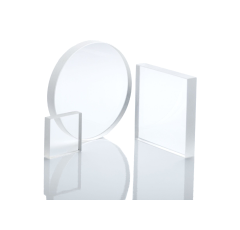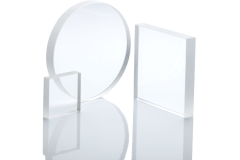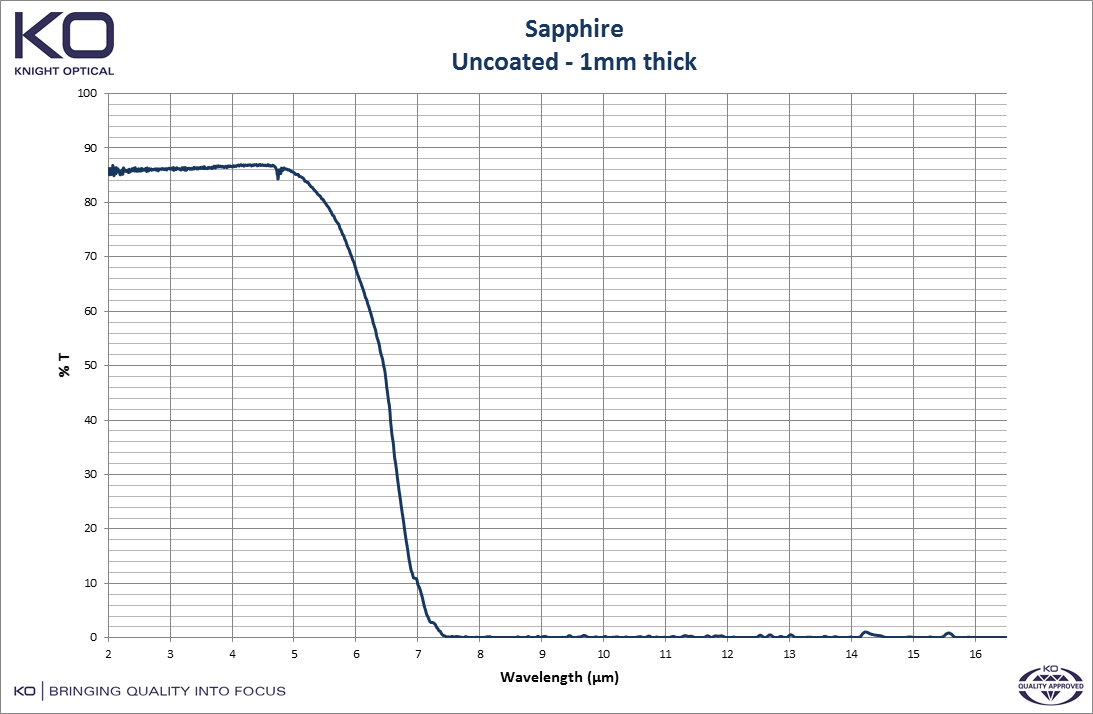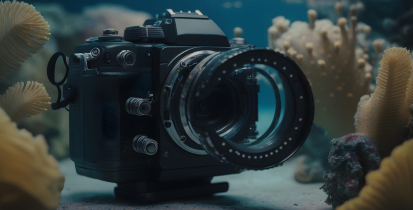

Stock Available
Bespoke Ordering Available
Knight Optical offers an extensive range of sapphire optics and optical components, including sapphire windows, sapphire lenses, sapphire prisms, and sapphire ground blanks.
Sapphire (Al2O3) holds the rank of the second hardest crystal, trailing only behind diamond, and flaunts an array of remarkable optical properties that make it a prime candidate for optical components and as such is often found in high-end sapphire optical lenses.
At Knight Optical we offer c-cut (UV grade) and random cut sapphire optics to fit in with your specific application.
We also provide both uncoated and coated sapphire optics, featuring broadband antireflective (BBAR) coatings, giving our partners flexibility in choice and performance.
Being a versatile material, sapphire in general and particularly sapphire’s lens price are often justified its price through its performance and durability. However, Knight Optical is extremely competitive on price for all sapphire optics, making your sapphire lens an achievable purchase.

Speak to our experts about your custom sapphire optics needs today
Call +44 (0)1622 859444Make a quick enquiry about Custom Sapphire Now
Dive into the forefront of optical solutions. Got questions about an optical product? Reach out now and let our expertise guide you.
Optical Properties of Sapphire
- Exceptional hardness: Providing robustness comparable to that of diamond
- Elevated sapphire optical transmission: Ensuring maximum light passage
- Resilience to chemical reactions: Can be used in harsh environments.
- Superior thermal conductivity: Ideal for applications requiring heat dissipation
- Elevated dielectric constant: Beneficial in various electrical applications
- Robust modulus of rupture: Indicative of its mechanical strength
It’s no surprise that sapphire is among the most widely used materials in the optical field. Given sapphire’s exceptional optical properties, it’s a go-to choice for various applications.
You can find a full data sheet of sapphire’s optical properties below.
Our typical manufacturing specifications are listed below, however, we are always expanding our capabilities so if your requirements are not mentioned below please contact our technical sales team who will guide you through your enquiry. All of our optics are quality assured and metrology tested.
| Transmission range | 0.17 to 5.5µm |
|---|---|
| Refractive Index | No 1.75449; Ne 1.74663 @ 1.06µm |
| Density | 3.97 g/cm3 |
| Melting Point | 2040°C |
| Hardness | Knoop 2000 with 2000g indenter |
| Diameter | < 5mm to 300mm |
|---|---|
| Form error (@633nm) | < 0.10 waves |
| Centration /parallelism | < 1 arc minute |
| Scratch/dig | < 40/20 |
| Typical coatings | BBAR @ 1-5µm, DLC @ 1-5µm |

Frequently Asked Questions
-
What are Sapphire Optics and What Makes Them Unique?
-
Sapphire Optics are durable due to the incredible hardness of the crystalline material, Mohs 9 compared to diamonds 10. Coupled with their extended transmission from UV through to infrared allows sapphire optical components to be used in a multitude of applications.
-
How Good is the Optical Transmission of Sapphire?
-
Sapphire’s optical transmission is excellent over an extended wavelength range. A 1mm thick sample of UV-grade sapphire transmits above 80% from 0.2µm to 5.5µm, increasing to 85% over the visible range.
-
Are Sapphire Crystal Lenses Better Than Traditional Lenses?
-
Sapphire lenses are more durable and can withstand harsh environments in comparison to lenses manufactured from more traditional materials such as N-BK7.
-
What is Optical Sapphire and How Does it Differ from Regular Sapphire?
-
Optical Sapphire has been synthetically manufactured to remove natural contaminants, giving the sapphire glass its transparent, colourless nature compared to the more traditional blue that sapphire crystals are known for. This process creates optical glass with an extended high transmission from UV through to infrared.
-
What are the Price Considerations for Sapphire Optics?
-
The application of the sapphire optics needs to be considered. If the optic is being used in imaging applications, more costly c-cut sapphire needs to be used where birefringence is not an issue. The team at Knight Optical work closely with our clients to ensure they are getting the most cost-effective solutions for their specific requirements.
Is your question not here?
We are ready and waiting to answer any queries you may have about sapphire optics.
Additional Information
Slight birefringence
Sapphire exhibits slight birefringence depending on its crystal orientation, resulting in two refractive indices when light permeates the optic. To eliminate this birefringence, it’s crucial to cut the sapphire in a manner that aligns the c-axis parallel to the optical axis. This ensures optimal optical transmission of sapphire, particularly in applications where imaging is key.
Fluorescence factors
If impurities like iron (Fe) or chromium (Cr) are present within the sapphire lattice, the material can fluoresce under UV light. For applications requiring fluorescence-free sapphire, it’s essential to grow the substrate from pure seed samples. This ensures sapphire’s optimal optical transmission and can influence the price based on purity levels.
Considerations
Polishing standards
To achieve a high standard of polishing, generally a 10:1 ratio of diameter-to-thickness is required.
Cut specifications
Typically, sapphire is offered as random-cut sapphire, which can display birefringence. If birefringence poses a problem for specific applications, such as imaging, then c-cut sapphire (UV grade sapphire) should be specified. This particular cut negates the issue of birefringence, ensuring optimal sapphire optical transmission.
Available Stock
Get in touch with us:
With our in-house state-of-the-art metrology laboratory you can be confident that your optical components will meet your requirements. You can find out more about our testing facilities here.

Operating for over 30 years
Knight Optical has been operating for over 30 years, with our managing director Colin Overton at the helm. Over this time, we have become a global leader in the production and distribution of scientific optical components and bringing quality into focus for all of our products and services that we provide.



